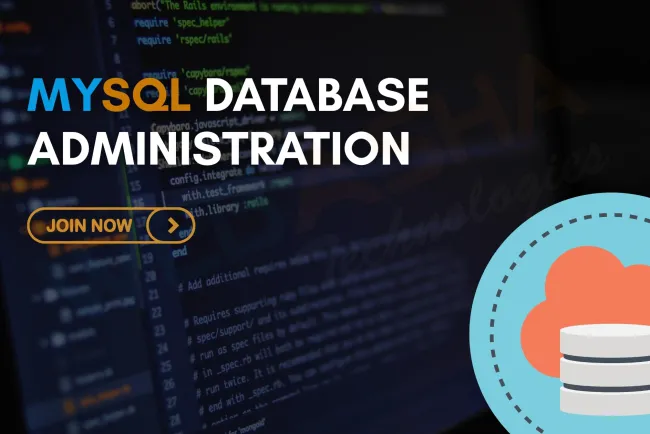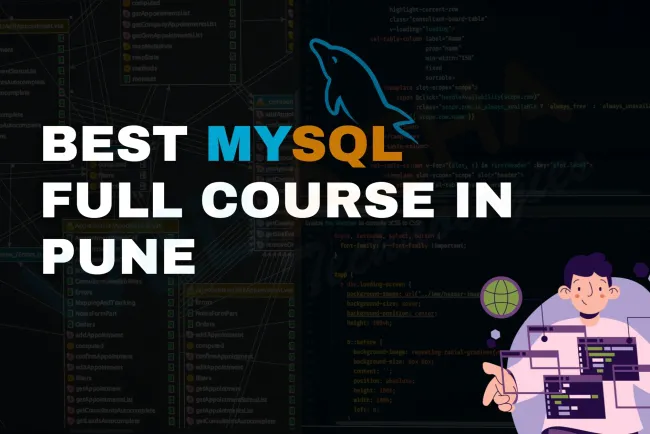Best MySQL Classes in 2025 | Learn SQL, Get Certified, and Build a Data-Driven Career
MySQL classes in 2025 offer structured, hands-on training to help beginners and professionals master database concepts, SQL queries, and MySQL tools. These classes equip learners with job-ready skills for roles like SQL Developer, Data Analyst, and Database Administrator, while also preparing them for globally recognized MySQL certifications. With online and offline options, practical projects, and expert guidance, enrolling in MySQL classes is a powerful step toward building a successful tech career in today’s data-driven world.

Table of Contents
- Why Take MySQL Classes in 2025?
- What Are MySQL Classes?
- Who Should Enroll in MySQL Classes?
- Key Skills You Will Learn in MySQL Classes
- Types of MySQL Classes
- Benefits of Joining MySQL Classes
- How to Choose the Best MySQL Classes
- MySQL Classes vs Self-Learning
- What Tools Will You Use in MySQL Classes?
- Conclusion
- Frequently Asked Questions (FAQs)
Learning MySQL in 2025 is one of the best career moves for students, IT professionals, and aspiring data experts. As businesses become increasingly data-driven, there is a growing need for professionals skilled in MySQL database management. Whether you're a beginner or an experienced developer, MySQL classes help you build essential skills in SQL programming, data querying, database administration, and backend development.
In this blog, we’ll cover everything about MySQL classes, including types, benefits, what you’ll learn, how to choose the right course, and career outcomes.
Why Take MySQL Classes in 2025?
Taking MySQL classes is one of the fastest ways to master the foundation of relational databases. These courses are designed to help you:
-
Understand SQL syntax and logic
-
Learn CRUD operations (Create, Read, Update, Delete)
-
Design and manage relational databases
-
Work with stored procedures, indexes, and joins
-
Prepare for MySQL certifications and real-world projects
With the rise of data analytics, web development, and cloud platforms, MySQL skills are becoming more valuable than ever.
What Are MySQL Classes?
MySQL classes are structured training programs that teach you how to use MySQL — one of the most popular open-source relational database management systems (RDBMS). These classes are available online and offline, ranging from beginner to advanced levels.
They typically include:
-
Lectures on SQL and database design
-
Hands-on projects using real MySQL databases
-
Assignments to reinforce learning
-
Quizzes and certification exam prep
Who Should Enroll in MySQL Classes?
These classes are ideal for:
-
College students pursuing IT, Computer Science, or Data Analytics
-
Working professionals transitioning to tech roles
-
Backend developers who need SQL knowledge
-
Data analysts and business intelligence professionals
-
Anyone preparing for MySQL certifications
Key Skills You Will Learn in MySQL Classes
| Skill Area | Topics Covered |
|---|---|
| SQL Basics | SELECT, INSERT, UPDATE, DELETE, WHERE, ORDER BY, LIMIT |
| Database Design | Normalization, ER diagrams, schema creation |
| Joins & Relationships | INNER JOIN, LEFT JOIN, RIGHT JOIN, CROSS JOIN, FOREIGN KEY |
| Stored Procedures & Views | Functions, Triggers, Views, Transactions |
| Performance Optimization | Indexing, Query Optimization, Caching Strategies |
| Security & Access Control | User Roles, Privileges, Authentication, Backup & Recovery |
Types of MySQL Classes
1. Beginner MySQL Classes
These courses focus on basic SQL commands, data filtering, and query structuring. Ideal for absolute beginners.
2. Intermediate MySQL Classes
Covers joins, aggregate functions, database normalization, and introduces stored procedures.
3. Advanced MySQL Classes
Includes topics like performance tuning, user access control, security, and data backup strategies.
4. MySQL for Web Development
Combines MySQL with PHP, Python, or Node.js to build dynamic web applications.
5. MySQL for Data Analysts
Focuses on data querying, report generation, pivoting, and integration with tools like Excel or Power BI.
Benefits of Joining MySQL Classes
-
Hands-On Learning: Real-world database projects and exercises.
-
Structured Curriculum: Learn step-by-step with guidance from expert instructors.
-
Certification Prep: Prepare for industry-standard MySQL exams.
-
Career Support: Gain job-ready skills for roles like SQL Developer, Database Administrator, and Data Analyst.
-
Flexibility: Choose between online, offline, and hybrid models.
How to Choose the Best MySQL Classes
When selecting a MySQL training program, consider the following:
-
Curriculum depth: Ensure the class covers core and advanced topics.
-
Hands-on projects: Opt for classes that involve practical assignments.
-
Instructor expertise: Check qualifications and experience of the trainer.
-
Learning mode: Choose between self-paced, live online, or in-person.
-
Certification support: Pick a class that helps you prepare for MySQL certification exams.
-
Career services: Some programs offer job placement assistance or internships.
MySQL Classes vs Self-Learning
| Factor | MySQL Classes | Self-Learning |
|---|---|---|
| Structured Learning | Yes | No |
| Expert Guidance | Available | Not available |
| Hands-on Practice | Included | May require setup |
| Certification Prep | Focused on exam readiness | May lack exam strategy |
| Career Support | Often included | Usually not included |
| Cost | May involve a fee | Usually free or low-cost |
What Tools Will You Use in MySQL Classes?
-
MySQL Workbench
-
phpMyAdmin
-
Command Line Interface (CLI)
-
XAMPP / WAMP for local servers
-
Live database examples from e-commerce or analytics
These tools will help you understand real-world scenarios and perform efficient database operations.
Career Opportunities After MySQL Classes
Completing a MySQL course opens up several career opportunities:
-
SQL Developer
-
Database Administrator (DBA)
-
Data Analyst
-
Backend Web Developer
-
BI (Business Intelligence) Developer
-
ETL Developer
-
Cloud Database Engineer
MySQL Certifications After Completing Classes
After completing your MySQL training, you can appear for:
-
Oracle Certified MySQL Database Administrator
-
Oracle Certified Professional MySQL Developer
-
MySQL for Data Analytics Certification
These certifications enhance your credibility and increase your chances of landing high-paying jobs.
Conclusion: Enroll in MySQL Classes and Unlock Career Growth
In 2025, MySQL classes are more relevant than ever. With businesses focusing on data and automation, learning MySQL opens doors to numerous opportunities in tech, analytics, and database management. Whether you're just starting out or upskilling, these classes provide a structured, hands-on path to becoming a database expert.
FAQs
What are MySQL classes?
MySQL classes are structured training programs that teach SQL querying, database management, and MySQL tools.
Who should take MySQL classes?
Students, developers, analysts, and IT professionals who want to learn database skills or prepare for MySQL certification should take these classes.
Are MySQL classes suitable for beginners?
Yes, beginner-level MySQL classes are designed to start from the basics of SQL and relational databases.
What topics are covered in MySQL classes?
Topics include SQL basics, joins, stored procedures, views, indexing, security, and database optimization.
How long does it take to complete a MySQL class?
It typically takes 4 to 12 weeks, depending on the course level and format (part-time or full-time).
Do MySQL classes include certification prep?
Yes, many classes prepare students for official MySQL certifications from Oracle and other recognized bodies.
Is MySQL still in demand in 2025?
Absolutely—MySQL remains a core technology in web development, data analysis, and enterprise databases.
Can I learn MySQL online?
Yes, there are online MySQL classes with live training, recorded sessions, and interactive labs.
What software is used during MySQL classes?
Most classes use tools like MySQL Workbench, phpMyAdmin, and XAMPP for hands-on database practice.
Are there job opportunities after learning MySQL?
Yes, you can apply for roles like SQL Developer, DBA, Data Analyst, or Backend Developer.
What is the average salary after completing MySQL classes?
Salaries vary, but many roles start at ₹3–6 LPA, with experienced professionals earning higher.
Are MySQL classes available in hybrid mode?
Yes, some institutes offer blended learning—a mix of online and in-person sessions.
Can MySQL be used with Python or PHP?
Yes, MySQL integrates well with Python, PHP, Node.js, and other back-end technologies.
What is the difference between SQL and MySQL?
SQL is a language; MySQL is a database system that uses SQL to manage data.
How do MySQL classes support real-world projects?
They offer case studies and live database assignments to build hands-on experience.
Do I need programming knowledge to learn MySQL?
No prior programming is required, but it helps if you have basic logic or coding familiarity.
Can I take MySQL classes while working full-time?
Yes, many classes offer weekend and evening batches to suit working professionals.
What are stored procedures in MySQL?
Stored procedures are predefined SQL routines that simplify database operations and logic.
Is there any free software to practice MySQL?
Yes, you can install MySQL Community Edition and use tools like MySQL Workbench for free.
How do I prepare for MySQL certification exams?
Enroll in a class that includes exam-focused training, mock tests, and guided projects.
Are MySQL classes worth the money?
Yes, they provide structured learning, industry insights, and career-boosting certification.
What is indexing in MySQL?
Indexing improves database performance by speeding up data retrieval.
Can MySQL handle big data?
While MySQL is powerful, it may not be ideal for massive big data—tools like Hadoop are better suited.
Is MySQL open-source?
Yes, MySQL is free and open-source, though there are also commercial versions.
How secure is MySQL?
MySQL offers user access control, encryption, and backup features to ensure data security.
What is normalization in MySQL?
Normalization is the process of organizing data efficiently in a database to reduce redundancy.
Can I use MySQL for mobile app databases?
Yes, MySQL can be used with mobile backends when connected via APIs.
What is the best IDE for learning MySQL?
MySQL Workbench is the most recommended IDE for beginners and professionals.
How do MySQL classes help in web development?
They teach you how to connect MySQL with backend languages and manage user data effectively.
Do MySQL classes include placement assistance?
Some institutes offer internships, resume support, and job placement services.












![Top 10 Ethical Hackers in the World [2025]](https://www.webasha.com/blog/uploads/images/202408/image_100x75_66c2f983c207b.webp)










